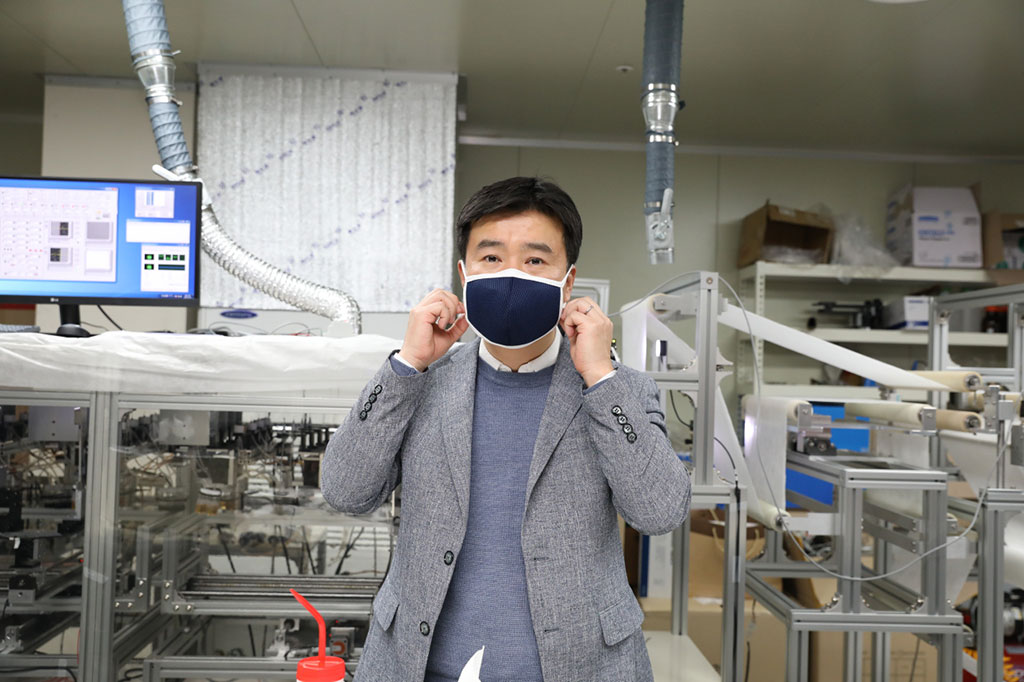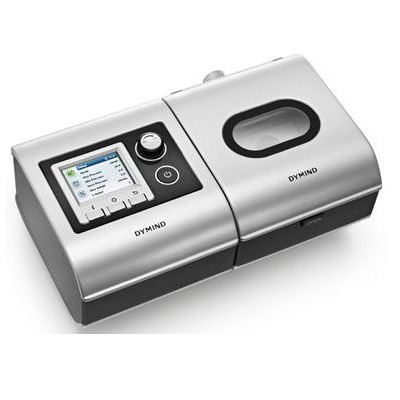Reusable Face Mask Could Help Remedy Worldwide Shortage
|
By HospiMedica International staff writers Posted on 30 Mar 2020 |

Image: Professor Kim Il-doo demonstrating his mask (Photo courtesy of KAIST)
A novel nano-filter face mask that maintains excellent filtration efficiency, even after multiple washing cycles, could help alleviate global supply shortages.
Developed at the Korea Advanced Institute of Science and Technology (KAIST; Daejeon, Republic of Korea), the nano-fiber mask is manufactured via an insulation block electrospinning process that fabricates orthogonal nanofibers with a diameter of 100~500 nm by controlling their spatial alignment. The unidirectional nanofiber structure can thus minimize air pressure delivery toward the filter and maximize filtration efficiency.
Existing masks fail to maintain air filtration since their electrostatic function disappears when exposed to water. In contrast to these disposable masks, which lack nano-fibers, the new masks are water resistant, with no deformation in the nano-membrane structure, even following 20 repeated hand washes, and despite soaking the masks in an ethanol solution for more than three hours. In addition, following 20 repeated bactericidal tests, the nano-fiber mask still exhibited more than 94% filtering efficiency. The reusable face mask could thus help relieve the challenges arising from the supply shortage of disposable face masks.
“We believe that this mask can be reusable for about a month even after washing in ethanol. The inner filter can also be replaced. This technology will solve the mask scarcity issue and environmental impact of mask waste,” said professor of materials science and engineering Il-Doo Kim, PhD. “We found that the mask filters out up to eighty percent of 600-nanometer particles, even after undergoing a bending test more than 4,000 times.”
Past experiences with severe acute respiratory syndrome (SARS), H1N1 swine influenza, and Middle East respiratory syndrome (MERS) indicate that surgical masks have been most widely adopted by the public as personal protective measure, despite controversy on their effectiveness. The most common face masks are disposable ones, originally made for filtering out up to 94 or 95 percent of fine dust, referred to as N94 or N95 masks.
Related Links:
Korea Advanced Institute of Science and Technology
Developed at the Korea Advanced Institute of Science and Technology (KAIST; Daejeon, Republic of Korea), the nano-fiber mask is manufactured via an insulation block electrospinning process that fabricates orthogonal nanofibers with a diameter of 100~500 nm by controlling their spatial alignment. The unidirectional nanofiber structure can thus minimize air pressure delivery toward the filter and maximize filtration efficiency.
Existing masks fail to maintain air filtration since their electrostatic function disappears when exposed to water. In contrast to these disposable masks, which lack nano-fibers, the new masks are water resistant, with no deformation in the nano-membrane structure, even following 20 repeated hand washes, and despite soaking the masks in an ethanol solution for more than three hours. In addition, following 20 repeated bactericidal tests, the nano-fiber mask still exhibited more than 94% filtering efficiency. The reusable face mask could thus help relieve the challenges arising from the supply shortage of disposable face masks.
“We believe that this mask can be reusable for about a month even after washing in ethanol. The inner filter can also be replaced. This technology will solve the mask scarcity issue and environmental impact of mask waste,” said professor of materials science and engineering Il-Doo Kim, PhD. “We found that the mask filters out up to eighty percent of 600-nanometer particles, even after undergoing a bending test more than 4,000 times.”
Past experiences with severe acute respiratory syndrome (SARS), H1N1 swine influenza, and Middle East respiratory syndrome (MERS) indicate that surgical masks have been most widely adopted by the public as personal protective measure, despite controversy on their effectiveness. The most common face masks are disposable ones, originally made for filtering out up to 94 or 95 percent of fine dust, referred to as N94 or N95 masks.
Related Links:
Korea Advanced Institute of Science and Technology
Latest Critical Care News
- 'Universal' Kidney to Match Any Blood Type
- Light-Based Technology to Measure Brain Blood Flow Could Diagnose Stroke and TBI
- AI Heart Attack Risk Assessment Tool Outperforms Existing Methods
- Smartphone Imaging System Enables Early Oral Cancer Detection
- Swallowable Pill-Sized Bioprinter Treats GI Tract Injuries

- Personalized Brain “Pacemakers” Could Help Patients with Hard-To-Treat Epilepsy
- Microscopic DNA Flower Robots to Enable Precision Medicine Delivery
- Origami Robots to Deliver Medicine Less Invasively and More Effectively
- Improved Cough-Detection Technology Aids Health Monitoring
- AI Identifies Children in ER Likely to Develop Sepsis Within 48 Hours
- New Radiofrequency Therapy Slows Glioblastoma Growth
- Battery-Free Wireless Multi-Sensing Platform Revolutionizes Pressure Injury Detection
- Multimodal AI to Revolutionize Cardiovascular Disease Diagnosis and Treatment
- AI System Reveals Hidden Diagnostic Patterns in Electronic Health Records
- Highly Sensitive On-Skin Sensing Monitor Detects Vitamin B6 and Glucose in Sweat
- Artificial Intelligence Revolutionizing Pediatric Anesthesia Management
Channels
Surgical Techniques
view channel
Minimally Invasive Endoscopic Surgery Improves Severe Stroke Outcomes
Intracerebral hemorrhage, a type of stroke caused by bleeding deep within the brain, remains one of the most challenging neurological emergencies to treat. Accounting for about 15% of all strokes, it carries... Read more
Novel Glue Prevents Complications After Breast Cancer Surgery
Seroma and prolonged lymphorrhea are among the most common complications following axillary lymphadenectomy in breast cancer patients. These postoperative issues can delay recovery and postpone the start... Read morePatient Care
view channel
Revolutionary Automatic IV-Line Flushing Device to Enhance Infusion Care
More than 80% of in-hospital patients receive intravenous (IV) therapy. Every dose of IV medicine delivered in a small volume (<250 mL) infusion bag should be followed by subsequent flushing to ensure... Read more
VR Training Tool Combats Contamination of Portable Medical Equipment
Healthcare-associated infections (HAIs) impact one in every 31 patients, cause nearly 100,000 deaths each year, and cost USD 28.4 billion in direct medical expenses. Notably, up to 75% of these infections... Read more
Portable Biosensor Platform to Reduce Hospital-Acquired Infections
Approximately 4 million patients in the European Union acquire healthcare-associated infections (HAIs) or nosocomial infections each year, with around 37,000 deaths directly resulting from these infections,... Read moreFirst-Of-Its-Kind Portable Germicidal Light Technology Disinfects High-Touch Clinical Surfaces in Seconds
Reducing healthcare-acquired infections (HAIs) remains a pressing issue within global healthcare systems. In the United States alone, 1.7 million patients contract HAIs annually, leading to approximately... Read moreHealth IT
view channel
Printable Molecule-Selective Nanoparticles Enable Mass Production of Wearable Biosensors
The future of medicine is likely to focus on the personalization of healthcare—understanding exactly what an individual requires and delivering the appropriate combination of nutrients, metabolites, and... Read moreBusiness
view channel
Philips and Masimo Partner to Advance Patient Monitoring Measurement Technologies
Royal Philips (Amsterdam, Netherlands) and Masimo (Irvine, California, USA) have renewed their multi-year strategic collaboration, combining Philips’ expertise in patient monitoring with Masimo’s noninvasive... Read more
B. Braun Acquires Digital Microsurgery Company True Digital Surgery
The high-end microsurgery market in neurosurgery, spine, and ENT is undergoing a significant transformation. Traditional analog microscopes are giving way to digital exoscopes, which provide improved visualization,... Read more
CMEF 2025 to Promote Holistic and High-Quality Development of Medical and Health Industry
The 92nd China International Medical Equipment Fair (CMEF 2025) Autumn Exhibition is scheduled to be held from September 26 to 29 at the China Import and Export Fair Complex (Canton Fair Complex) in Guangzhou.... Read more














